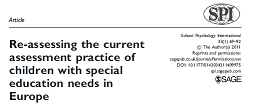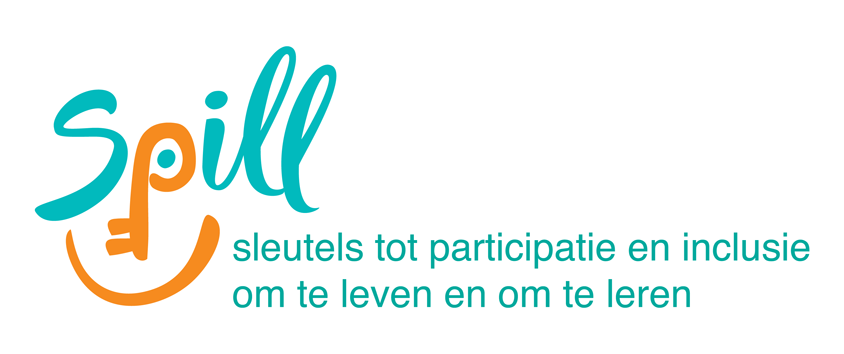![]() The DAFFODIL project (Dynamic Assessment of Functioning Oriented at Development and Inclusive Learning) was a European Comenius project (2008-11), with partners from 7 countries (Belgium, Hungary, Sweden, Romania, Portugal, Norway, and the British Virgin Islands), led by the University of Antwerp. It focused on “assessment (evaluation) & coaching”: how do the way and methods used to evaluate children with difficulties (both functional evaluation and learning performance evaluation) affect their participation in education? Does this hinder inclusive learning, or are there ways to promote inclusive education? The project developed guidelines, a book and DVD, and several articles .
The DAFFODIL project (Dynamic Assessment of Functioning Oriented at Development and Inclusive Learning) was a European Comenius project (2008-11), with partners from 7 countries (Belgium, Hungary, Sweden, Romania, Portugal, Norway, and the British Virgin Islands), led by the University of Antwerp. It focused on “assessment (evaluation) & coaching”: how do the way and methods used to evaluate children with difficulties (both functional evaluation and learning performance evaluation) affect their participation in education? Does this hinder inclusive learning, or are there ways to promote inclusive education? The project developed guidelines, a book and DVD, and several articles .
Results – publications
 | Book and DVD . Lebeer, J., Candeias, A.A., & Grácio, L. (Eds.) (2011), With a different glance. Dynamic Assessment and Functioning of Children Oriented at Development & Inclusive Learning. Antwerp/Apeldoorn: Garant. If schools are to become ‘inclusive schools for all’, as stated in the UN Convention on the Rights of Persons with Disabilities, the way of assessing function and evaluating performance needs to be throughly reviewed. This book aims to propose some alternatives: in addition to exploring a child’s functional problems, assessment methods should also look at learning potential, how children learn and the learning context (teachers, parents). The purpose of assessment should be to adequately plan and monitor a challenging educational programme so that the child can be maximally included. The accompanying DVD contains sample videos of dynamic assessment, inclusive education, counseling for inclusive education, as well as articles and presentations. The book aims to make school psychologists and other professionals involved in the assessment of learning and developmental difficulties aware of the need and opportunity to look at children from a different perspective: in a more inclusive and developmental way. The book is only available in English via: https://www.maklu.be/MakluEnGarant/en/BookDetails.aspx?ID=9789044128024 |
 | Article Lebeer, J., Birta-Szekely, N., Demeter, K., Bohács, K., Candeias, A.A., Sønnesyn , G., Partanen, P., Dawson, L. (2011), Re-assessing the Current Assessment Practice of Children with Special Education Needs, School Psychology International, 33 (1), 69-92. DOI 10.1177/0143034311409975. This article describes a research on current testing practices in Europe regarding children with learning difficulties/disabilities. Standardized normative tests, which assess a child’s functional performance, make up the vast majority. The article provides a well-founded critique of why this assessment practice works against the realization of inclusive education. Download here a full text |
 | A special issue “Psychological and Educational Aspects of Inclusion” of the Transylvanian Journal of Psychology (2013) features everything you ever wanted to know about inclusive education…New insights into brain-gene interaction (Jo Lebeer) – Twenty Evidence-Based Strategies for Inclusive Learning (David Mitchell) – Teaching thinking (Dorothy Howie) – Conceptualizing inclusive pedagogies (S.Keiron) – Inclusion and cognition with deaf learners (David Martin) – Inclusive math education (A.Desoete) – Social prejudice (K. Demeter) – Learning from each other – Evaluating dynamically and ecologically (J.Lebeer ea) – Implementation of ICF in Portugal (Saragoça) – Becoming a different teacher (I.Vandeputte) – A kindergarten assistant course for people with learning disabilities (M. Hemelsoet) – Temporary moments in inclusive education – Cognitive mediation in the Feuerstein Center of Cluj-Napoca, a “socio-ecological-cognitive” laboratory. Download here a full text in pdf |
Why a project like Daffodil is needed
Despite international developments towards inclusion (UN Convention on the Rights of Persons with Disabilities 2006), in practice many children are referred to special education because of difficulties in following the school system, disability and/or functional problems. Assessment systems are outdated: they are too static, they point the finger at the child. They are also too focused on shortcomings. Test reports are rarely appropriate for inclusive education because they don’t look at a child’s potential, they label them pathologically, and they don’t advise teachers on how to engage a child who has a tendency to drop out. It makes all the difference whether you create an Individually Adapted Education Plan based on a disability label or based on a learning potential assessment. The OECD recognizes a European problem with children who underachieve in education. Special learning needs are increasing. Children from ethnic minorities or socio-economically less favorable circumstances are particularly at risk of dropping out. The DAFFODIL project focused on assessment & coaching: assessing the child’s functioning in a dynamic way, looking at the potential, while at the same time looking at and coaching the school context to receive and educate all children, including those with difficulties. The DAFFODIL project aims to connect three main evaluation systems – each working from its own frame of reference – dealing with the child with a disability: the ‘medical world’, the school system and the pupil guidance centers
Objectives
Develop and try out a model of a functional, dynamic-interactive and contextual evaluation and coaching, both of children who experience barriers to learning, and of their environment (schools, families). Such assessment & coaching should lead to a more adequate, Individually Adapted Education Plan (IAP or IEP) that can be used to promote development and facilitate inclusive education. DAFFODIL also wants to set up a coaching system “from assessment to practice”, where both the child and its context are central to the intervention
Partners
België BE Universiteit Antwerpen, Project Learning Enhancement & Inclusion, Faculty of Medicine & Health Sciences, Disability Studies, c/o Prof. dr. (emer) Jo Lebeer
Hungary HU University of Szeged , Dept. of Education, Prof. Dr. Beno Csapo & Krisztina Bohac
Sweden SE PPS Elevhälsen, Ostersund, Solveig Westerlund & Vivianne Mattsson & Skolutveklarna, Ostersund, Petri Partanen
Portugal PT University of Évora, Dept Psychology, Prof. Dr. Adelinda Araujo Candeias
Roemenië RO Babes Bolyai University, Dept. of Psychology, Prof. Dr. I. Szamoskozi, Noemi Szekely, Matyas Negulescu, Karmen Demeter
Norway NO Institute for Applied Pedagogy & Pedverket, Voss, Gunvor Sønnesyn, Andreas Hansen & Morten Hem
British Virgin Islands BVI Ministry of Education, Dept. of Special Needs services, Lorna Dawson
Associate partners
- IT: Università Bicocca, Scienze della Formazione . Roberta Garbo
- BE: Plantijn Hogeschool, Centre for Inclusion & Enablement INCENA, Beno Schraepen
- PT: Universade Tecnica de Lisboa, Vitor Cruz
- DK: Videncenter for Rådgivning & Specialpædagogik Marianne Katborg
Dislaimer
 The Daffodil project was financially supported by the European Commission from 2008-2011 under the Comenius Program Life-Long Learning Contract number 142084-2008-LLP-BE-COMENIUS-CMP. The Commission cannot be held responsible for the content. The authors are solely responsible for the content
The Daffodil project was financially supported by the European Commission from 2008-2011 under the Comenius Program Life-Long Learning Contract number 142084-2008-LLP-BE-COMENIUS-CMP. The Commission cannot be held responsible for the content. The authors are solely responsible for the content
